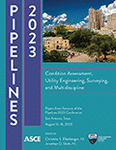Condition Prediction of Sanitary Sewer Pipe Data Set with Imbalanced Classification
Publication: Pipelines 2023
ABSTRACT
Inspection and condition assessment of pipelines play a vital role in the successful operation and maintenance of systems. In the United States, closed-circuit television (CCTV) is the commonly used device for inspecting the inner environment of sanitary sewer pipes. Inspection of every individual sanitary sewer pipe segment is not feasible for any municipality owing to its large inventory of pipes and incurred cost. Machine learning (ML) algorithms, such as logistic regression (LR), k-nearest neighbors (k-NN), and random forests (RF), were employed to develop condition prediction models that could predict the sanitary sewer pipes in need of repair or a maintenance activity. Although the LR model was unable to capture any sewer pipe in poor condition, the same model has resulted in a reasonably higher area under the curve (AUC) value of 0.76. This phenomenon was found to be due to higher imbalance in the data set. Therefore, the study aimed to overcome the limitation of imbalanced classification by employing techniques such as random under sampling and random over sampling. ML algorithms were employed for all three sampled data sets. With an F1-score of 0.94, the RF model outperformed both LR and k-NN models. The developed models can be utilized by utility owners and municipal asset managers to make more informed decisions on future inspections of sewer pipelines.
Get full access to this article
View all available purchase options and get full access to this chapter.
REFERENCES
ASCE. (2017). Report Card for America’s Infrastructure. New York: American Society of Civil Engineers (ASCE).
EPA. (2002). Asset Management for Sewer Collection Systems. Washington, DC: Office of Wastewater Management.
Haixiang, G., Yijing, L., Shang, J., Mingyun, G., and Yuanyue, H. (2017). Learning from class-imbalanced data: Review of methods and applications. Expert Systems With Applications, 220–239.
Hossin, M., and Sulaiman, M. (2015). A Review on Evaluation Metrics for Data Classification Evaluations. International Journal of Data Mining and Knowledge Management Process.
Kaur, K., Ghalambor, S., Najafi, M., and Jibreen, A. (2022a). Evaluation of a Hybrid Polyurea Spray Applied Pipe Lining for Structural Pipe Rehabilitation. In Proceedings of the North American Society for Trenchless Technology NASTT’s 2022 No-Dig Show, Minneapolis, MN, USA, 10–14 April 2022.
Kaur, K., Ghalambor, S., Najafi, M., Jibreen, A., and Arjun, M. (2022b). Testing and Evaluation of a Hybrid Polyurea Spray Applied Pipe Lining for Structural Applications. In Proceedings of the ASCE Pipeline Conference, Indianapolis, IN, USA, 31 July–03 August 2022.
Loganathan, K. (2021). Development of a Model to Prioritize Inspection and Condition Assessment of Gravity Sanitary Sewer Systems. Dissertation, University of Texas at Arlington, Arlington, TX, US.
Loganathan, K., Najafi, M., and Kumar Maduri, P. (2022). Development of a Model to Prioritize Inspection and Condition Assessment of Gravity Sanitary Sewer Systems. In Pipelines 2022 (pp. 1–9).
Malek Mohammadi, M. (2019). Development of Condition Prediction Models for Sanitary.
Najafi, M., and Gokhale, S. (2021). Trenchless Technology: Pipeline and Utility Design, Construction, and Renewal, Second Edition. New York: McGraw-Hill.
Najafi, M., and Kulandaivel, G. (2005). Pipeline Condition Assessment Prediction Using Neural Network Models. ASCE Pipelines, 767–781.
NASSCO. (2018, January). Pipeline Assessment Certificate Program.
Tanha, J., Abdi, Y., Samadi, N., Razzaghi, N., and Asadpour, M. (2020). Boosting methods for multi–class imbalanced data classification: an experimental review. Journal of Big Data, 1–47.
Teh, K., Armitage, P., Tesfaye, S., Selvarajah, D., and Wilkinson, I. D. (2020). Imbalanced learning: Improving classification of diabetic neuropathy from magnetic resonance imaging. Oversampling improvements in diabetic neuropathy MRI.
Tscheikner-Gratl, F., et al. (2020). Sewer asset management – state of the art and research needs. Urban Water Journal, 662–675.
Wirahadikusumah, R., Abraham, D., and Iseley, T. (June 2001). Challenging Issues in Modeling Deterioration of Combined Sewers. ASCE Journal of Infrastructure Systems, 77–84.
Yijing, L., Haixiang, G., Xiao, L., Yanan, L., and Jinling, L. (2016). Adapted ensemble classification algorithm based on multiple classifier system and feature selection for classifying multi-class imbalanced data. Knowledge-Based Systems, 94, 88–104.
Information & Authors
Information
Published In
History
Published online: Aug 10, 2023
ASCE Technical Topics:
- Algorithms
- Architectural engineering
- Artificial intelligence and machine learning
- Building management
- Business management
- Computer programming
- Computing in civil engineering
- Construction engineering
- Construction management
- Engineering fundamentals
- Government
- Infrastructure
- Inspection
- Lifeline systems
- Local government
- Maintenance and operation
- Mathematics
- Organizations
- Pipeline systems
- Pipes
- Practice and Profession
- Sanitary sewers
- Sewer pipes
- Sewers
- Steel pipes
Authors
Metrics & Citations
Metrics
Citations
Download citation
If you have the appropriate software installed, you can download article citation data to the citation manager of your choice. Simply select your manager software from the list below and click Download.
